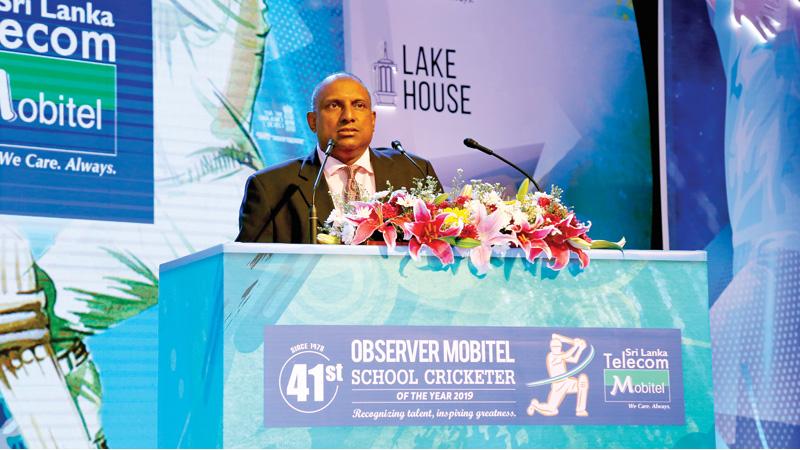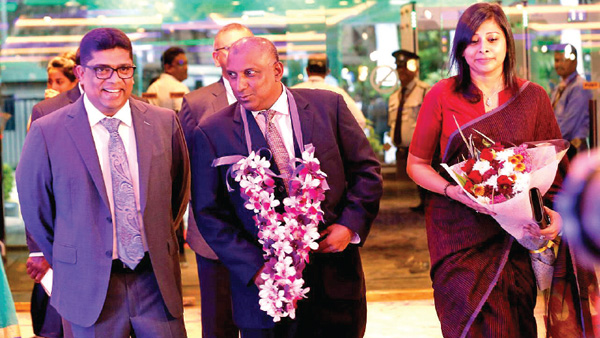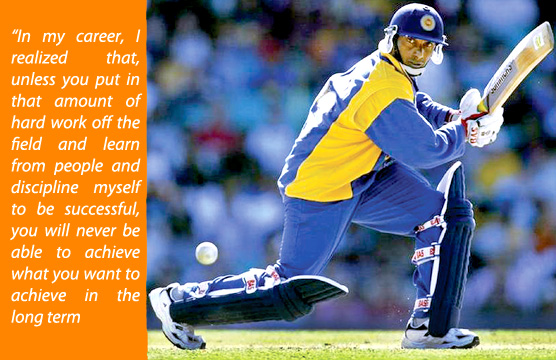
There is a common saying that “all work and no play makes Jack a dull boy” and, in this aspect, former Sri Lanka cricket captain and legendary cricketer Aravinda de Silva has followed this proverb to the very letter.
 “When I started, as a young little boy like you’ll, one thing I really enjoyed was playing cricket, more so playing sports. Like any other child, I didn’t enjoy studies very much, which I keep telling my wife all the time. When my children want to enjoy sports, she says studies are more important, and that’s one thing I don’t agree with her, but she keeps pressing me not to keep advising the children in that manner,” said De Silva at the 41st Observer-Mobitel School Cricketer Awards presentation at Hilton Colombo where he was the chief guest.
“When I started, as a young little boy like you’ll, one thing I really enjoyed was playing cricket, more so playing sports. Like any other child, I didn’t enjoy studies very much, which I keep telling my wife all the time. When my children want to enjoy sports, she says studies are more important, and that’s one thing I don’t agree with her, but she keeps pressing me not to keep advising the children in that manner,” said De Silva at the 41st Observer-Mobitel School Cricketer Awards presentation at Hilton Colombo where he was the chief guest.
“But there is a reason for me to say it. The reason being that, for me to achieve what I have achieved today, the sport of cricket has taught me so much in life and also taught me more than what I’ve learnt in a classroom.”
Rolling back the years when he was a child, De Silva said, “I remember going back home after school and the first thing I would want is to meet my friends and either go and play cricket, rugby, soccer, tennis, badminton or whatever sport we could get together and play on that particular day.
“My life carried on like that. My mother always pushed me to do my studies and my father was one person who always let me do enjoyed. There came a time where I had to take some serious decisions. Why I want to tell you the story is because you need to understand that the fame you see is not the reality of life.
 “When I continued my sport and there was a decision to be made when I had to sit for my ‘A’ levels. I was playing cricket for my school and then suddenly I got picked to the national side to tour England. There was a decision I had to make, whether to go to England or whether I am going to stay and do my ‘A’ levels. I remember my father and mother having a big argument over this. My mother wanted me to stay back and do my ‘A’ levels and my father came up to me and asked ‘Son, what do you like to do?’ My obvious answer was to be on that tour to England and that was something I was always dreamt of and when that opportunity came I told him that this is what I wanted to do.
“When I continued my sport and there was a decision to be made when I had to sit for my ‘A’ levels. I was playing cricket for my school and then suddenly I got picked to the national side to tour England. There was a decision I had to make, whether to go to England or whether I am going to stay and do my ‘A’ levels. I remember my father and mother having a big argument over this. My mother wanted me to stay back and do my ‘A’ levels and my father came up to me and asked ‘Son, what do you like to do?’ My obvious answer was to be on that tour to England and that was something I was always dreamt of and when that opportunity came I told him that this is what I wanted to do.
“Without any hesitation I remember what he told me. He said, ‘Son, you’ve got a roof over your head, so you don’t have to worry. You go ahead and do what you really enjoy doing.’ That was the beginning and I told my father that I would come back and seriously focus and continue my studies. I went on that tour and it was quite a successful one for me. I played my first test match at Lord’s as the ‘baby’ of the team - I was only 17 years of age. I came back and told my father that I will fulfill the promise I made to him before I left,” De Silva said.
 Recollecting his thoughts, De Silva said, “Though we had practices on a regular basis, I told my father that I would attend some classes after practices and then look forward to the exam. The whole year went ahead, I used to finish practices and go for my classes at about 8.30-9 and finish at about 10.30-11 in the night and I got to the stage where the exam was around the corner.
Recollecting his thoughts, De Silva said, “Though we had practices on a regular basis, I told my father that I would attend some classes after practices and then look forward to the exam. The whole year went ahead, I used to finish practices and go for my classes at about 8.30-9 and finish at about 10.30-11 in the night and I got to the stage where the exam was around the corner.
“Unlike nowadays, the tours were staggered over three months before you get another tour so I had some time to do my studies. When I was just about to sit for my ‘A’ levels, the Cricket Board announced another tour of Australia and, unfortunately or fortunately, I don’t know, I was picked to tour again. It was a crucial time and I had to decide whether to do my ‘A’ levels or to go on that tour. The same situation arose at home with my father and mother, but unfortunately my mother had to be let down again and I decided to go on that tour which actually turned the corner for me,” he said.
Meeting his childhood hero West Indian great Viv Richards on a flight from Melbourne to Sydney taught De Silva that nothing comes easy in life.
“That particular day I realized the kind of effort and the sacrifice you would have to make to achieve what he has achieved all through his career. We see only a part of it on television and we think it comes very easy for him because he is naturally talented and the way he goes out there and faces any bowler without any fear. He’s been very successful over a period of time,” said De Silva.
“In my career, I realized that, unless you put in that amount of hard work off the field and learn from people and discipline myself to be successful, you will never be able to achieve what you want to achieve in the long term. It’s like a sustainable business, you can have a flash in the pan, have a good couple of years, but to be sustainable you’ve got to be disciplined and structured.
“Today, what I have learnt from this game of cricket is something amazing. I run an organization with about 1300 people and I deploy most of the learning which I have acquired through my cricketing career, on how to be successful.”
